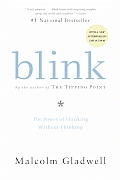 by Malcolm Gladwell
by Malcolm Gladwell
Shoot/Don’t Shoot. Speed Dating. Student teacher evaluations. Coke or Pepsi? How do you decide?
The answer, according to Malcolm Gladwell, is quicker than you think. Quicker than you can think. The thesis of his book, Blink, is that you make snap decisions by filtering out extraneous information, a process Gladwell calls “thin-slicing.” You go with pattern recognition and pre-existing associations that you can’t possibly be conscious of at the time. Further, he argues persuasively, unless you’re a trained professional, you can’t get inside the “locked box” holding your thought processes – any attempts to verbalize what’s going on will only make things worse. The good news: you can be trained to make better snap-judgments.
Bill Bellichek said something related after his Patriots beat Peyton Manning’s Colts in the playoffs this year. He said that he just wanted to make Manning think one split-second longer than he was used to. It’s also why Allen Iverson is suddenly helping, rather than carrying, his team. Attendance at practice (“we’re talkin’ about practice“) has improved his in-game judgment. In fact, sports relies so heavily on this kind of thinking that the whole book could have been nothing but sports stories. Happily, Gladwell doesn’t take this easy way out.
Gladwell puts together disparate information into a sometimes-disturbing pattern. It turns out that many of our judgments – frequently about other people – that we consider to be well-thought-out are in fact reached in a couple of seconds. If these judgments are based on association, and if we unconciously associate certain races with “good” or “bad”, for instance, we can believe that we’re consciously compensating and still reach a biased conclusion.
One may disagree with the conclusions, but Gladwell makes a reasoned, unhysterical case that needs to be taken seriously. The experiment to uncover these associations is astonishingly simple. I have not investigated the literature on its reliability. Another experiment involved sending testers of different races and sexes to negotiate car deals. Gladwell’s point, that there’s a whole subconscious world of signals and counter-signals, is evident, but he admitted in an email reply that he could have been clearer that it cuts both ways.
Another problem is that language – and facial expression, for that matter – define as well as express our thoughts. The act of describing a face forces us to use certain imprecise words. If it’s not a face we know well, we will modify our recollections to fit the archetypes described by those words. Tricked into thinking we can accurately analyze what’s going on, we find ourselves trapped by, rather than enlightened by words.
Here’s where a professional actually does have an advantage. He has a specialized vocabulary that lets him precisely pigeon-hole each of the complex flavors he’s tasting. Which means, when he labels them, he gets just what he’s looking for – he doesn’t have to modify his memories to fit the words. The words allow for precise recall of even so nebulous a concept as taste or smell. I certainly have make fun of wine reviewers who refer to “smoky, rounded overtones with a hit of fruity undercarriage,” but it turns out that stuff really does help the reviewer. Whether or not it helps the reader is another question, of course. The key here is that it takes years to trains yourself this way.
Taking the key point, that there’s critical information that your brain can focus on in a blink, Gladwell compares the Amadous Diallo shooting in New York a few years back to a similar case where the policeman didn’t shoot, correctly, as it turns out. He marvels at the staggering amount of focused detail that can be taken in by the brain in much less than a second.
Gladwell is at his best when he’s examining people in systems. Tipping Point is about why ideas seem to reach a critical mass. Another essay is about how some people are “connectors” who know everyone. This is about an individual as a system. It’s full of big, interesting ideas, and it doesn’t disappoint.